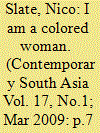| Srl | Item |
| 1 |
ID:
085867


|
|
|
|
|
| Publication |
2009.
|
| Summary/Abstract |
In the midst of the Second World War, feminist, socialist, and anti-colonial activist Kamaladevi Chattopadhyaya spent 18 months travelling and speaking in the United States. She aimed to increase American support for Indian independence, while establishing connections with American feminists and African Americans, and defending the rights of women and people of colour throughout the world. Kamaladevi championed a coloured cosmopolitanism that defied narrow, chauvinist definitions of race, religion, or nation, while simultaneously encouraging the unity of 'coloured' peoples. She envisioned Indian independence as a crucial step toward the liberation of the entire 'coloured world'. By sharing her expansive understanding of coloured solidarity with her Indian readers, Kamaladevi contributed to the knowledge and persistence with which Indians criticized American racism. India's independence, coupled with the rise of the Cold War, endowed Indian criticism of American racial oppression with new power. Beginning in the late 1940s, Indian opinion helped pressure American presidents, Supreme Court justices, and diplomatic officials, afraid of losing the propaganda battle of the Cold War, to resolve civil rights crises and to instigate significant domestic reforms. Tracing the genesis and impact of Kamaladevi's coloured cosmopolitanism reveals the long and diverse history of Indian critiques of American racism.
|
|
|
|
|
|
|
|
|
|
|
|
|
|
|
|
| 2 |
ID:
164402


|
|
|
|
|
| Summary/Abstract |
This paper sheds some light on the new landscape of digital feminist activism in Saudi Arabia, which has been rarely analyzed using the lens of social movements theories. I specifically focus on the Twitter campaign to end the male guardianship system, in which a growing number of Saudi women have reclaimed the use of Twitter to disseminate their claims and demand social reforms, maneuvering by that a constraining political environment that is characterized by a dearth of channels for civic engagement, lack of traditional forms of feminist organizing, and different calculations for mobilization, and in this way the women’s movement does resemble a state of abeyance. Consequently, the paper presents new evidence that challenges the traditional take on abeyance by emphasizing on how Twitter can be used as a catalyst for the emergence and preservation of ad-hoc abeyance networks that enables and sustains the feminist movement activities.
|
|
|
|
|
|
|
|
|
|
|
|
|
|
|
|
| 3 |
ID:
121994


|
|
|